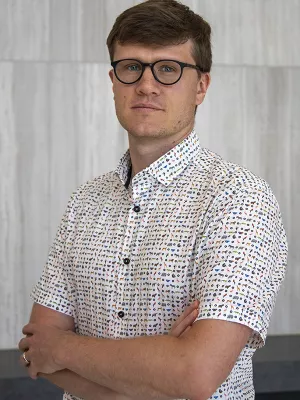Open to change: UTM psychologist seeks to measure children's ‘intellectual humility’

Given increased societal polarization, it’s more important than ever to be humble about what we know, listen to different perspectives, consider evidence and be willing to change one’s mind based on that evidence.
In short, it’s important to be intellectually humble.
Samuel Ronfard, director of the University of Toronto Mississauga Childhood Learning and Development (ChiLD) Lab and an assistant professor in UTM’s department of psychology, is trying to find out if children can be intellectually humble.
He specializes in cognitive development — how children’s thinking changes over time — and is currently studying the development of “intellectual humility” in children aged six to 10.
“What’s incredible about humans is that we think about these wide-ranging concepts,” Ronfard says. “We think about infinity, we think about God. We think about atoms. And not only do we think about a broad range of things, but we create new concepts. We can think new thoughts.”
“Kids aren’t born into the world knowing these things,” he points out. “When they’re young, they think of the world in a particular way, and their thinking changes. This is what I find fascinating. How do they change their mind? Is it hard? How long does it take? What are the mechanisms involved?”

Children can be incredibly confident in what they believe. And yet they are arguably the most curious knowledge seekers among us.
Can they be intellectually humble? And, are intellectually humble children more aware of what they know and don’t know?
With support from the John Templeton Foundation, Ronfard and collaborators from across North America and Europe are establishing the first-ever tool to measure intellectual humility in young kids.
Over the next four years, they’ll lay the groundwork for a developmental science of intellectual humility, in hopes of learning how it changes across childhood — and ultimately across the lifespan.
“If we can’t measure something, we can’t really study it,” Ronfard says. “We can’t see if it changes, we can’t design studies to manipulate it to see if it’s malleable. This project will give the field the tools to be able to do that.”
As part of the multi-phase, multi-site project, the group is first developing a self-report survey that can measure intellectual humility in children between the ages of six and 10. In its second phase, they will distribute the tool to researchers in other parts of the world with different populations to use as part of their own projects.
From there, the team will be able to learn more about the generalizability of the scale and to refine it as needed.
“We don’t want to build something that will only work with Canadian and American children,” says Ronfard. “We want to build something that, when translated, can be studied across the world. It may reveal cultural differences that might make a difference in how intellectual humility develops.”
Together, the two phases will provide the team with preliminary information about how intellectual humility develops in early childhood, perhaps paving the way for more research on how we can all foster it effectively.
In a society that has multiple and diverse perspectives, Ronfard argues that being intellectually humble helps people work together and solve problems. And that, in turn, makes for a stronger community.
“If you’re able to reflect on the limitation of your knowledge and value other people’s perspectives, if you’re able to change your mind — even about things you’d rather not change your mind about — if you have new evidence that suggests you were wrong, you’re going to have a more accurate understanding of the world,” he says.
“And in a democracy, deliberative decision-making relies on compromise, on the ability to listen to each other and to get at the truth and what’s right,” Ronfard adds. “I think that in a world where people are increasingly polarized, intellectual humility might be a really important virtue to cultivate.”
What is intellectual humility? Watch below:
The intellectual humility project is a collaboration of researchers including: Andrei Cimpian from New York University, Judith Danovitch from the University of Louisville, Jamie Jirout from the University of Virginia, Candice Mills from the University of Texas Dallas, Joshua Rottman from Franklin and Marshall College, and Azzurra Ruggeri from the TUM School of Social Sciences and Technology and Central European University.



